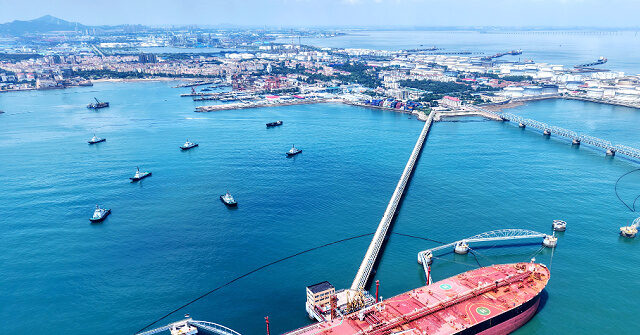The Financial Times (FT) on Wednesday published a report co-authored with a research group called C4ADS about a complex global network that is moving huge amounts of oil from Russia, Iran, and Venezuela to China in defiance of sanctions.
The scheme reportedly involved an Iranian accountant working for a Panamanian commodity broker called Ocean Glory Giant, setting up “naval mortgages,” which essentially put ships up as collateral for loans to buy oil. The arrangement allegedly grew to include over 30 ships worth nearly a billion dollars.
The fishy part of the deal was the oil, which ostensibly came from Iraq, Malaysia, and other legal points of origin. In reality, tracking data revealed the ships were picking up cargoes of banned oil from Iran, Venezuela, and Russia.
The ships were likewise allegedly registered to dodgy Chinese holding companies that appear to have been fronts for Chinese entities placed under sanctions by President Donald Trump during his first term.
The result, as described by C4ADS investigator Andrew Boling, was that Ocean Glory became “a sort of super-broker for sanctioned crude,” creating complex paper trails that thwarted U.S. efforts to maintain sanctions on oil from Iran, Venezuela, and Russia.
The scheme appears to have gotten off the ground within a month of Secretary of State Mike Pompeo warning oil buyers to take all possible precautions to avoid buying Iranian products because “the risks are simply not going to be worth the benefits.”
C4ADS investigators believe most of the Western entities drawn into the sanctions-evasion scheme did perform due diligence, but the network was complex enough to defeat routine background checks. The tactic of using naval mortgages to finance the oil trades kept big Western banks with aggressive investigators out of the picture.
The ships involved in the scheme did not appear on sanctions lists at first, although some of them were named later when the sanctions expanded. A vast maze of Chinese managers and corporations was involved, making it difficult to trace the activity to sanctioned entities. Some of those companies were linked to the Chinese state, which regards U.S. sanctions on states like Iran, Venezuela, and Russia as “illegal” and makes no pretense of enforcing them.
Maritime risk expert Claire Jungman told FT she had never seen the naval mortgage strategy before, despite her expertise in the field of oil smuggling. She said the scheme was a bold effort to exploit “the grey zones between maritime law, finance, and geopolitics.”
“Since 2019, Iran’s oil trading networks have become increasingly sophisticated and decentralized, reliant on front companies, informal intermediaries and registries willing to look the other way,” she said.
The naval-mortgage ring, a subset of the vast “shadow fleet” of sanctions-evading ships that serves the interests of Russia and China, illustrates the difficulty of maintaining strict sanctions when a major global power is determined to break them.
Russian Industry and Trade Minister Anton Alikhanov said on Tuesday that sanctions are nevertheless biting into Russia’s trade with China. Bilateral trade slipped by 8.1 percent in the first half of 2025 after hitting a record volume of $245 billion in 2024.
“In the medium term, we should expect more moderate growth rates than before,” Alikhanov said at a Russia-China business forum in the Russian city of Kazan.
Some of this reduction in trade came not from Western sanctions, but rather from reduced demand as both the Russian and Chinese economies sputtered, and occasionally from protectionist squabbles.
For example, Russian regulators banned the import of some Chinese trucks at the end of July because they allegedly had inferior brakes and seatbelts, although some observers wondered if it had more to do with plummeting sales for Russian automakers.
Read the full article here


